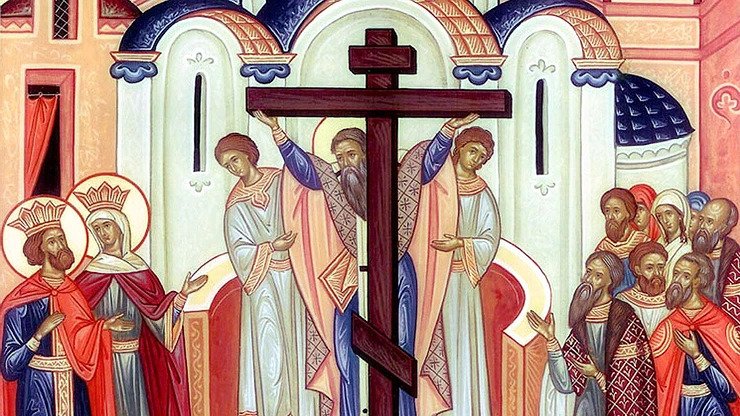Then Moses led Israel onward from the Red Sea, and they went into the wilderness of Shur; they went three days in the wilderness and found no water. When they came to Marah, they could not drink the water of Marah because it was bitter; therefore it was named Marah. And the people murmured against Moses, saying, ‘What shall we drink?’ And he cried to the Lord; and the Lord showed him a tree, and he threw it into the water, and the water became sweet.” (Ex 15: 22-25a)
This passage is from the first reading at Vespers on the great feast of the Exaltation of the Cross, celebrated today (NC). What does this passage have to do with the feast? The “tree” that Moses throws into bitter water, and that makes the water sweet, is traditionally seen as an image of the “life-giving” Cross.
Water itself, essential for our biological life, is an image of life. But our life, in merely biological terms, devoid of Christ and His cross-carrying journey, can be bitter. The small and great pains through which we inevitably journey, as we transition from one life-situation to another, can be pure bitterness for us, outside of the Cross. Because from a Christ-less, Cross-less perspective, they are meaningless. And meaninglessness, as Carl Jung noted, is one of the biggest traumas of the modern-day psyche: Today we tend to fear, said Jung, that our lives are meaningless.
But in light of the com-passionate, co-suffering with us of the God-Man, Who walked through all our suffering and darkness, even unto death on a cross and descent into our hell, we are given new meaning and new purpose in our New Companion, our primary cross-carrier and Lord Jesus Christ, Who brings us new life through His death. Admittedly, He doesn’t explain to us the “meaning” of all our suffering. Instead He, Who is the eternal Logos, Meaning itself, takes on, in our shoes, all our darkness and suffering, by walking through it in His humanity, and then overcomes it in His divinity, trampling death “by death.” In communion with Him, we go forward His way, of walking through things, according to our responsibilities, rather than avoiding them. And then He does the rest, by His grace, overcoming in us our merely-human anxieties and discouragement, into which we easily slip when on our own, in self-reliance, trying to carry all the ups and downs of the world on our own shoulders. In Him, I discover the “ease” and “light” of His Way, if I just try it; if I try His “how,” rather than ask my “why,” and connect with Him today. “Come to me, all who labor and are heavy laden,” He says to me today, “and I will give you rest. Take my yoke upon you, and learn from me; for I am meek and humble in heart, and you will find rest for your souls. For my yoke is easy, and my burden is light.” (Mt 11: 28-30) So let me try Him today, and find rest for my soul.






